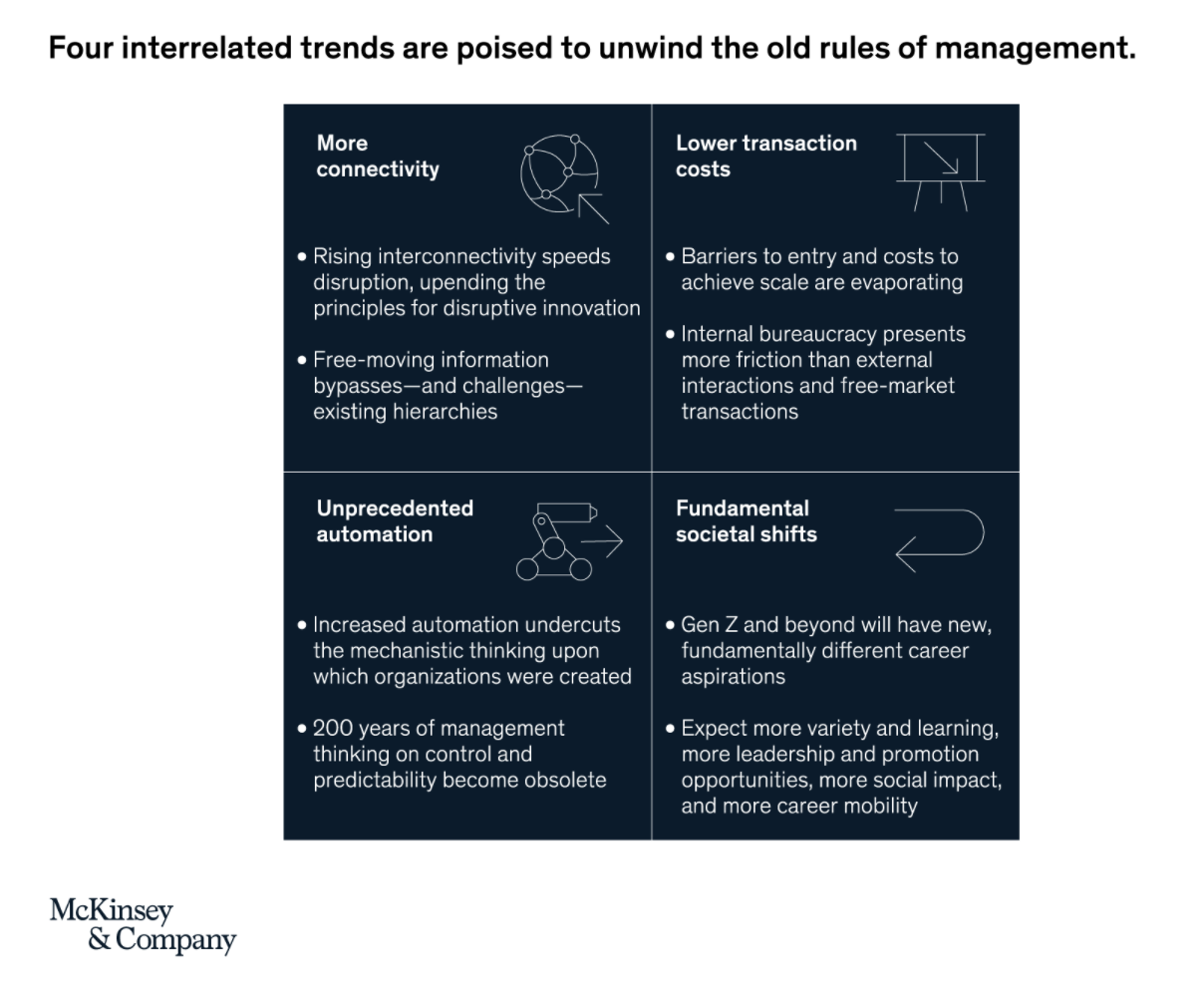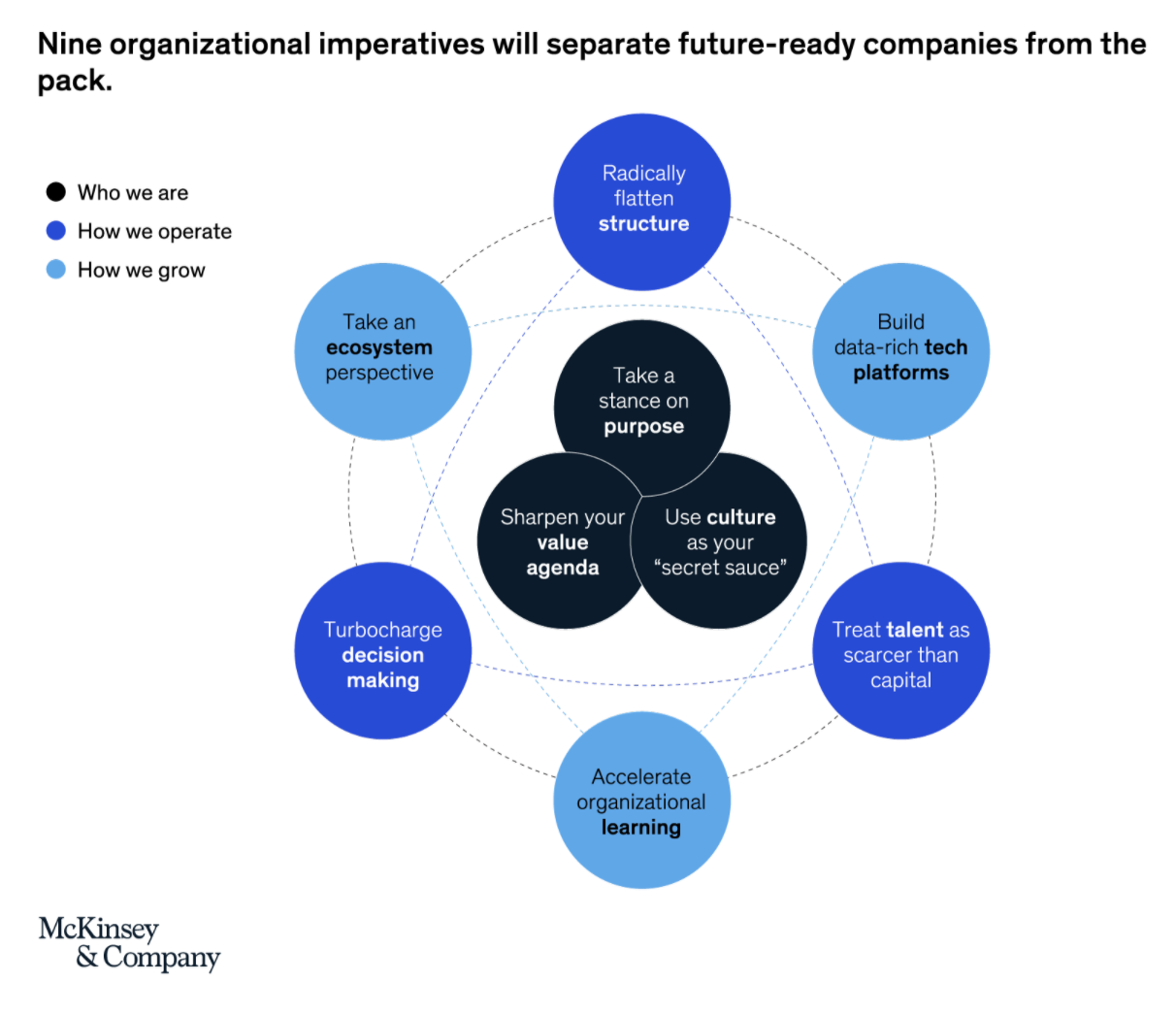More people are moving into freelancing than ever before. For some, it’s an imperative due to a lost job. For others, it’s a resiliency plan, taking on freelance work in addition to full-time jobs. Even big businesses are getting into bed with freelancers, hiring them more and more. There is some thought leadership on the subject of freelancing, but by and large it’s still an industry of individuals. There may be over 50 million freelancers in the world, but there are few connection points between them. Thankfully, new research from McKinsey and Company applies to freelancers, giving everyone more insight into how the industry could go.
McKinsey and Company published new original research on the nine keys to becoming a future-ready company. Built for Fortune 500 companies (and wannabe Fortune 500 companies), on the surface it doesn’t look like a study for freelancers. However, the “radically better” organization framework has a lot of parallels that freelancers can learn from.
Why a new model is necessary
The research, published January 2021, is set in the context of COVID-19 recovery. Vaccine roll-outs are underway (if slow), and there’s an arguable “end in sight” for the pandemic. To start, McKinsey looks at four interconnected trends that will impact businesses: more connectivity, lower transaction costs, unprecedented automation, and fundamental societal shifts.

Source: McKinsey and Company
The study then makes a clear declaration: reinvention is needed. The original management concepts chart dates back to 1854, so clearly it’s time for a refresh.
McKinsey and Company’s nine keys to success
For businesses to succeed in the future, McKinsey says they need nine traits spread across three categories. The first category is “Who we are” and contains: purpose, values, and culture. Category two is “How we operate” and contains: structure, decision making, and talent. Category three is “How we grow” and contains: ecosystems, tech platforms, and learning.

Source: McKinsey and Company
This is where freelancers can really learn from McKinsey’s research. Diving into the takeaways, there are clear parallels between what a big corporation should do and what a freelancer should do.
1 – Take a stance on purpose
In the report, McKinsey and Company says, “Future-ready companies recognize that purpose helps attract people to join an organization, remain there, and thrive. Investors understand why this is valuable, and factor purpose into their decision making: the rise of environmental, social, and governance (ESG)–related funds is just one of the ways they acknowledge that purpose links to value creation in tangible ways.”
For freelancers, taking a stance is perhaps even easier. You can operate more simply – and definitely have lower operating costs than your average corporation. The real insight from this step is two words – “on purpose.” Clients want to do business with people (and companies) that know who they are. Falling into a stance versus choosing it from the start are two very different things. And if you do fall into a stance, then make sure you choose it from that point on.
2 – Sharpen your value agenda
Freelancers need values. It’s a critical law of success in freelancing. Freelancers run businesses of one, but they are still businesses. And since the legal structure of a business is separate from you as a person, the business needs a value agenda just as you do on a personal level.
“While all companies have a strategy for how they create value,7 few can show precisely how the organization will achieve it,” says the report. “Future-ready companies, by contrast, avoid this dilemma by creating a value agenda—a map that disaggregates a company’s ambitions and targets into tangible organizational elements such as business units, regions, product lines, and even key capabilities. Armed with such a depiction, these companies can articulate where value is created in the organization, what sets the company apart from the pack, and even what might propel its success in the future.”
3 – Use culture as your “secret sauce”
It might sound weird to talk about culture with freelancers, given the whole business of one thing. But culture can be more broadly defined to how something gets done. And that lesson applies to freelancers. When you think about your values and how you get work done – do you prioritize certain clients? If so, by what metric? How do you treat clients you can’t help? What do you do when someone really needs your help but can’t afford a full project with you? These types of questions are all, broadly, answered by your “culture.”
“Telltale signs of a strong culture of performance include leaders who consistently carry out the behaviors the company aspires to, work practices that stand out and feel fresh to outsiders, and innovative approaches to important moments,” says the report.
As you build your business up, think of the actions you take and qualifying criteria you use. Those all sum up to be your culture, whether you stay as a business of one, work with other freelancers, or even build your own agency.
4 – Radically flatten structure
This is an area where freelancers have a clear advantage over big businesses. And big businesses are realizing this, too – and hiring more freelancers. As a freelancer, you are both your boss, your employee, and your contractor. So while McKinsey’s report offers advice for flattening a hierarchical structure of people, the freelancer takeaway is to leverage technology to streamline your operations.
Take your day, and itemize the tasks you do. Then categorize them into “roles” as if you were running a company of multiple people. When were you the CEO? The customer success lead? The sales lead? The client delivery lead? The janitor? The office manager or accounts receivable rep? For each, see what can be offloaded to technology – or perhaps even another freelancer who specializes in the task at hand. That way you can flatten your own ‘structure’ to ensure you’re more resilient to shocks and more ready to deal with whatever comes your way.
5 – Turbocharge decision making
When the report talks about decision making, it doesn’t necessarily mean more autonomy. Instead, it’s talking about systems. This is something that critically applies to freelancers, who can be notorious for making it up as they go along (I say that with love as a fellow freelancer).
“Achieving quality and speed in tandem takes work. It requires a system that properly allocates decisions to the right executives, teams, individuals, or even algorithms,” says the report.
As a freelancer, you won’t need to worry about the delegation aspect. Instead, focus on the system aspect. Identify clear processes, trigger points, and qualifying criteria that help you make decisions about which clients to take on, when to say yes to things, when to say no, and how to evaluate spending money. Creating these systems will not only help with better decisions, but also reduce the mental load you have to dedicate to every decision.
6 – Treat talent as scarcer than capital
In this section, the report is specifically talking to leaders with large teams and big profit and loss (P&L) statements. It tells them to consider three challenges: what talent is necessary, how the talent can be attracted, and how it can be managed most effectively.
The freelancing world is a bit different for obvious reasons, but the intention here is pure. You are your most valuable resource. Money in the bank is nothing if you are burnt out and can’t work anymore. You can’t grow your business if you are only ever your “employee” but never your “CEO.”
Further, don’t be afraid to outsource and offload some of your work. You’ll need to spend money on it, but think of it this way. If it costs $ 100 to outsource an hour-long task, that’s $ 100 spent. But if you can use that hour to take a sales call that lands a $ 500 contract, the expense was well worth it. And chances are that $ 100 also got you higher quality work than you’d have done alone.
7 – Adopt an ecosystem view
Too many freelancers see other freelancers as competition. That’s simply not the case. Even when you are doing the same kind of freelancing.
The McKinsey and Company report shares the example of Tesla open sourcing its patents and encouraging other people to use its technology. While this seemed altruistic, it really provided Tesla with an ecosystem. If everyone was using Tesla batteries, for instance, then there would be a market for Tesla battery chargers and other Tesla technology.
Freelancers can take advantage of this mentality as well. Share how you do things. Share your decision processes and frameworks. Talk about your rates and sales techniques. If everyone starts using your method and is successful, it will come back to you via referral business, increased branding opportunities, or the chance to monetize the knowledge itself as a course or book.
8 – Build data-rich tech platforms
This headline has a lot of buzzwords, but the concept applies well to freelancers. In the report, McKinsey and Company writes about Netflix’s recommendation engine. The engine shows you content Netflix thinks you will like based on what you’ve watched already – and it now accounts for 80% of content watched on the site.
The Netflix recommendation engine idea applies to freelancing in a few possible ways. For example: client patterns. If you are a freelance writer and notice all of your small business clients ask for a blog but really ended up needing a landing page, document that insight. The next time a small business prospect asks for a blog, you can be up front that every other small business really needed a landing page in the end. That could land you either more work, a happier client, or both. Regardless, you can avoid the unpleasantness that comes with a client not realizing what they truly need – and blaming you as the freelancer.
9 – Accelerate learning as an organization
Freelancers are in charge of their own professional development. That means, continuing the mindset that you are running a business, setting aside time and budget for your own professional development.
“High-performing companies promote a mindset of continuous learning that encourages and supports people to adapt and reinvent themselves to meet shifting needs,” says the report.
For freelancers, learning can come in a variety of forms, but the top three are to dive into your specific work (i.e. taking a writing course as a freelance writer), learning more about your passions outside of work, or learning more about the business side of freelancing. The report indicates that no matter what, you need a growth mindset for the learning to be successful.
Freelancing is a business
Taking a cue from Fortune 500-focused research doesn’t always seem logical for freelancers. However, there are many lessons to be learned. The key thing to remember is that freelancing is a business. You may be your boss and your employee, but you are an entrepreneur at the end of the day. As freelancing grows in the world – with no signs of slowing down – there’s more opportunity than ever to grow a thriving freelance business.
Business & Finance Articles on Business 2 Community
(35)